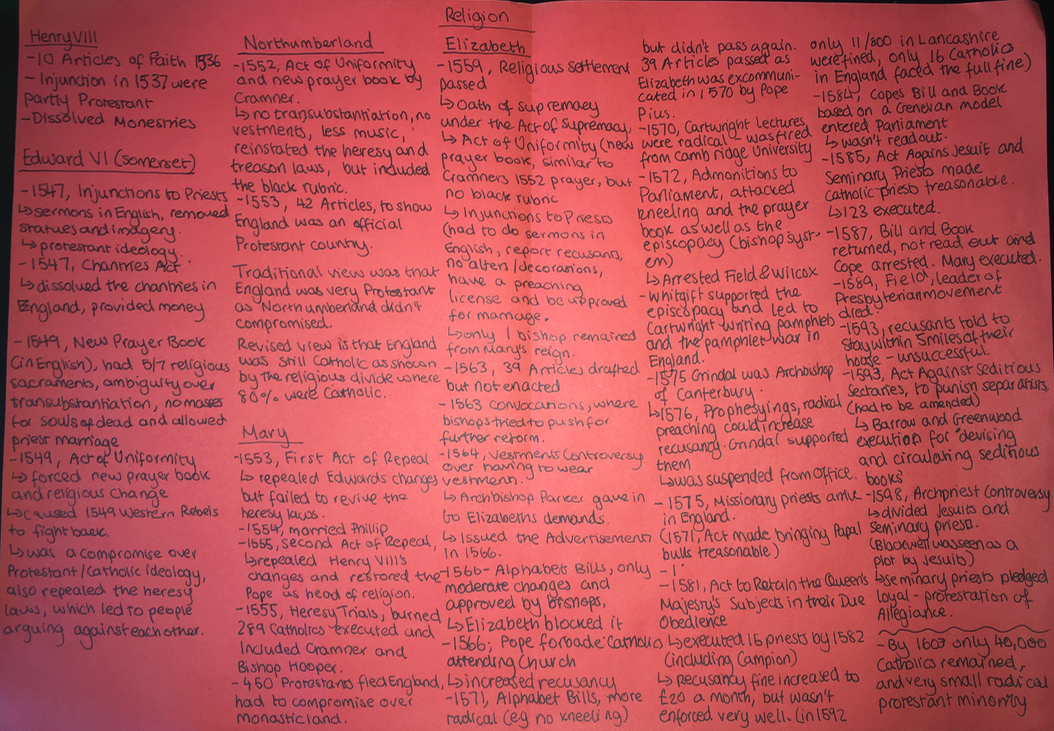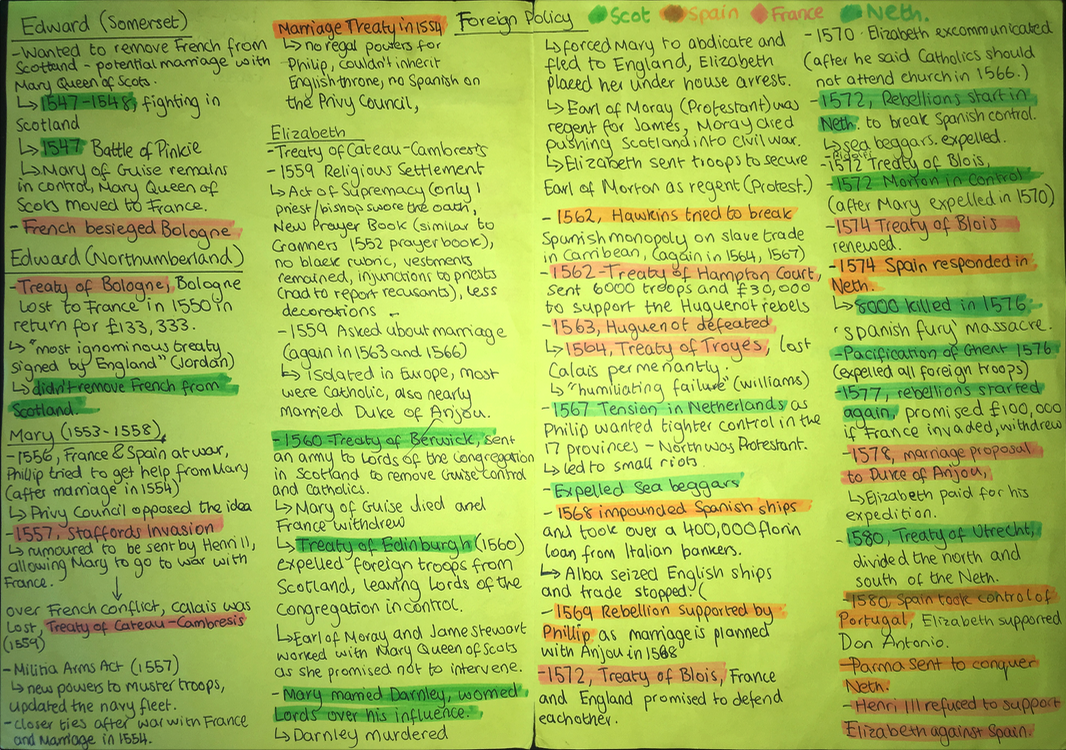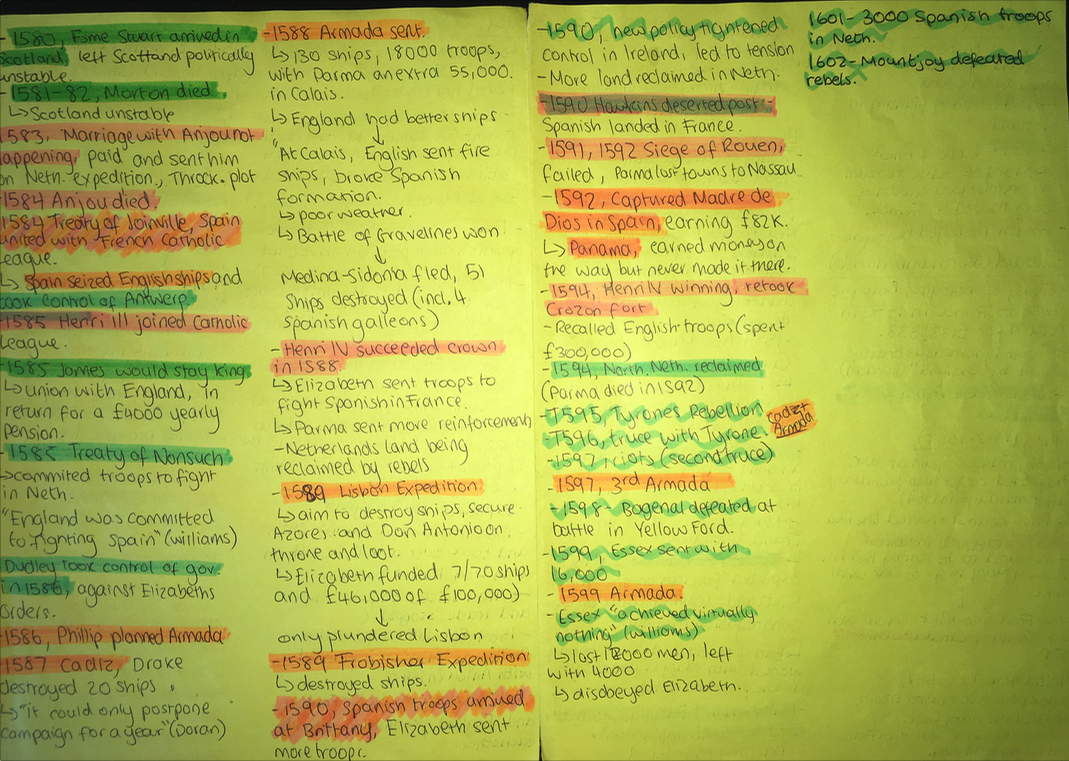[AQA] The Triumph of Elizabeth 1547-1603 Revision Notes [A2 - HIS3B]
So tomorrow is the A2 History exam and in case anybody here is worrying about the exam, I have compiled and condensed my notes for the exam tomorrow, some points may not be in full detail, so you may have to look up some extra information on those which don't have any descriptions below them or any arrows. Sorry in advance if I have left out anything.
The exam is divided into 3 sections: Religion , Foreign Policy, and Government/Parliament & Social Policy. In addition to these, there are 3 plots and 4 rebellions which link with different sections.
My Notes
Religion

Foreign Policy


The exam is divided into 3 sections: Religion , Foreign Policy, and Government/Parliament & Social Policy. In addition to these, there are 3 plots and 4 rebellions which link with different sections.
My Notes
Religion

Foreign Policy


First off talk about how Parliament opposed Somerset, Northumberland, Mary and Elizabeth in either religion, foreign policy or social policy.
Were a force to be reckoned with:
Somerset's 1547 Chantries Act struggles to pass through Parliament
Mary was not being able to seize the land of Protestant exiles and when Mary didn't even try to reclaim the monastic land that was dissolved under Henry VIIs reign as she knew that it wouldn't pass through Parliament.
She was unable to pass the heresy laws in 1553 along with her 1st Act of Repeal, it had to be passed in 1555 with her 2nd Act of Repeal.
After Mary married Phillip in 1554, Philip was refused a coronation by Parliament.
Elizabeth's 1559 Religious Settlement (Act of Uniformity and Prayer Book, Oath of Supremacy and Injunctions to Priests) barely passed by merely a few votes in Parliament. This was after Elizabeth had implanted Protestant Bishops into the House of Lords, arrested Catholic lords and used 'Men of Business' such as Norton in the Commons to sway the vote.
Elizabeth had Parliament intervene in her royal prerogative over marriage when they asked in about it in 1559. 1563 and 1566, as well as who would succeed her.
1572, Elizabeth's New Poor Law was opposed by many MPs in the Commons for being to nice to the poor over fears that it wouldn't prevent people from becoming vagrants.
1593, the Act Against Seditious Sectaries was scrutinised by many protestant MPs for being too aggressive on their own religion, forcing Elizabeth to amend it to be less cruel.
Finally the monopolies controversy. In 1597 Parliament raised the issue that Elizabeth's prerogative over monopolies were harming the people by reducing competition and soaring prices, one hated monopoly was that of the playing cards. Elizabeth had to promise to scrutinise current patent holders and allow citizens to sue them as well. The issue returned in 1601 and even Cecil couldn't control it, as not enough had been done to please the MPs, and now posed a threat to Elizabeth as there was possibility they would refuse her a tax subsidy for war with Spain. Elizabeth then had to revoke monopolies that were unpopular.
Weren't a power to be reckoned with:
Somerset was able to pass his 1549 Edwardian Act of Uniformity despite the majority of England (80%) being Catholic. He was also able to pass many proclamations has he only needed 12/25 Privy councillors to sign it for it to be enacted.
Mary was able to very easily pass her 1st and 2nd Act of Repeal in 1553 and 1555 when only a few people voted against it.
Elizabeth was still despite facing opposition able to pass her 1559 Religious Settlement (only use if you hadn't spoken about before)
Elizabeth passed her 9 Articles and banned papal bulls in 1571.
Able to pass the Act to Retain the Queen's Majesty's Subjects in their Due Obedience in 1581 and the Act Against Jesuit and Seminary Priests in 1585.
Overwhelming support for Elizabeth financially when she was at war with Spain. She received tax subsidies in 1589 and 93 as well as double and triple subsidies. At the time it was unconventional to tax citizens.
1597 Tillage Act and 1598 Poor Laws accepted
1601 New Poor Law and tax subsidy granted.
Were a force to be reckoned with:
Somerset's 1547 Chantries Act struggles to pass through Parliament
Mary was not being able to seize the land of Protestant exiles and when Mary didn't even try to reclaim the monastic land that was dissolved under Henry VIIs reign as she knew that it wouldn't pass through Parliament.
She was unable to pass the heresy laws in 1553 along with her 1st Act of Repeal, it had to be passed in 1555 with her 2nd Act of Repeal.
After Mary married Phillip in 1554, Philip was refused a coronation by Parliament.
Elizabeth's 1559 Religious Settlement (Act of Uniformity and Prayer Book, Oath of Supremacy and Injunctions to Priests) barely passed by merely a few votes in Parliament. This was after Elizabeth had implanted Protestant Bishops into the House of Lords, arrested Catholic lords and used 'Men of Business' such as Norton in the Commons to sway the vote.
Elizabeth had Parliament intervene in her royal prerogative over marriage when they asked in about it in 1559. 1563 and 1566, as well as who would succeed her.
1572, Elizabeth's New Poor Law was opposed by many MPs in the Commons for being to nice to the poor over fears that it wouldn't prevent people from becoming vagrants.
1593, the Act Against Seditious Sectaries was scrutinised by many protestant MPs for being too aggressive on their own religion, forcing Elizabeth to amend it to be less cruel.
Finally the monopolies controversy. In 1597 Parliament raised the issue that Elizabeth's prerogative over monopolies were harming the people by reducing competition and soaring prices, one hated monopoly was that of the playing cards. Elizabeth had to promise to scrutinise current patent holders and allow citizens to sue them as well. The issue returned in 1601 and even Cecil couldn't control it, as not enough had been done to please the MPs, and now posed a threat to Elizabeth as there was possibility they would refuse her a tax subsidy for war with Spain. Elizabeth then had to revoke monopolies that were unpopular.
Weren't a power to be reckoned with:
Somerset was able to pass his 1549 Edwardian Act of Uniformity despite the majority of England (80%) being Catholic. He was also able to pass many proclamations has he only needed 12/25 Privy councillors to sign it for it to be enacted.
Mary was able to very easily pass her 1st and 2nd Act of Repeal in 1553 and 1555 when only a few people voted against it.
Elizabeth was still despite facing opposition able to pass her 1559 Religious Settlement (only use if you hadn't spoken about before)
Elizabeth passed her 9 Articles and banned papal bulls in 1571.
Able to pass the Act to Retain the Queen's Majesty's Subjects in their Due Obedience in 1581 and the Act Against Jesuit and Seminary Priests in 1585.
Overwhelming support for Elizabeth financially when she was at war with Spain. She received tax subsidies in 1589 and 93 as well as double and triple subsidies. At the time it was unconventional to tax citizens.
1597 Tillage Act and 1598 Poor Laws accepted
1601 New Poor Law and tax subsidy granted.
Any predictions for tomorrow???
Quick Reply
Related discussions
- AQA A-Level History 1D and 2O Notes
- OCR AS-Level History Unit 1 (Y136-Y138,Y143) - 17th May [Exam Chat]
- A level history-Later tudors 1547-1603
- OCR A-Level History Unit 1 (Y101-Y113) - 9th June 2023 [Exam Chat]
- AQA GCSE History Paper 2 (8145/2) - 7th June 2023 [Exam Chat]
- Urgent tudors help
- OCR A-level History British period study and enquiry: All exams 10th Jun 2022
- A-level History Study Group 2023-2024
- A Level History (AQA) Revision in 80 days
- AQA History A Level Revision in 80 days
- AQA A Level History Paper 1 (options A to L) 7042/1C - 26 May 2022 [Exam Chat]
- What's the best way to study Elizabeth (Aqa GCSE History)?
- I got all 8s and 9s at GCSE AMA
- (AQA) A Level Law Notes + Study Group 📚💼
- A-Level History NEA on witchcraft
- Economic's AS + A2 Notes (ALL BOARDS)
- GCSE History AQA 2024 predictions
- HISTORY GCSEs..
- A-level History Study Group 2022-2023
- AQA A-Level Biology Revision Notes (New Spec)
Latest
Trending
Last reply 18 hours ago
AQA A Level History Paper 1 (7042/1A-1L) - 23rd May 2024 [Exam Chat]Last reply 18 hours ago
AQA A Level History Paper 2 (7042/2A-2T) - 7th June 2024 [Exam Chat]Last reply 2 days ago
Edexcel A Level History Paper 2 (9HI0 2A-2H) - 7th June 2024 [Exam Chat]Last reply 4 days ago
Edexcel GCSE HISTORY PAPER 1 (1HI0 10-13) - 15th MAY [Exam Chat]Last reply 4 days ago
Edexcel A Level History Paper 1 (9HI0 1A-1H) - 23rd May 2024 [Exam Chat]Last reply 1 week ago
OCR A-Level HISTORY PAPER 3 (Y301-Y321) - 23rd MAY [Exam Chat]Last reply 2 weeks ago
History Edexcel A level Britain Transformed and USA Conformity and ChallengeLast reply 3 months ago
AQA A-level History USA: Making of a Superpower (7042/1K) - 24 May 2023 [Exam Chat]Last reply 3 months ago
AQA A Level History - Making of Modern Britain(2S) Exam Chat - 9th June 2023Trending
Last reply 18 hours ago
AQA A Level History Paper 1 (7042/1A-1L) - 23rd May 2024 [Exam Chat]Last reply 18 hours ago
AQA A Level History Paper 2 (7042/2A-2T) - 7th June 2024 [Exam Chat]Last reply 2 days ago
Edexcel A Level History Paper 2 (9HI0 2A-2H) - 7th June 2024 [Exam Chat]Last reply 4 days ago
Edexcel GCSE HISTORY PAPER 1 (1HI0 10-13) - 15th MAY [Exam Chat]Last reply 4 days ago
Edexcel A Level History Paper 1 (9HI0 1A-1H) - 23rd May 2024 [Exam Chat]Last reply 1 week ago
OCR A-Level HISTORY PAPER 3 (Y301-Y321) - 23rd MAY [Exam Chat]Last reply 2 weeks ago
History Edexcel A level Britain Transformed and USA Conformity and ChallengeLast reply 3 months ago
AQA A-level History USA: Making of a Superpower (7042/1K) - 24 May 2023 [Exam Chat]Last reply 3 months ago
AQA A Level History - Making of Modern Britain(2S) Exam Chat - 9th June 2023



